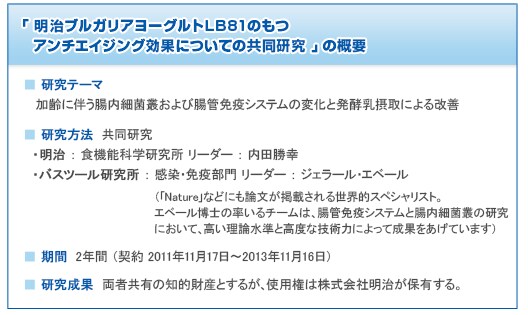|
Top page > Forefront of lactic acid bacteria research > Joint research on lactic acid bacteria with the Pasteur Institute
Joint research on lactic acid bacteria with the Pasteur InstituteDuring the two-year period from November 2011 to November 2013, Meiji conducted a joint research project with the Pasteur Institute of France to study LB81 lactic acid bacteria. It was the first time the renowned Institute had ever conducted joint research with a Japanese company alone, and on such a large, fully-committed scale. Up to that point, the general understanding of lactic acid bacteria was that they directly affected the intestinal microbiota, promoted the growth of good bacteria, and discouraged the proliferation of bad bacteria, thus improving the balance among intestinal microorganisms, or intestinal flora, leading to various health implications. Through the joint research conducted with the Pasteur Institute, Meiji additionally learned that LB81 lactic acid bacteria affected the immune cells distributed in the intestinal tract and improved the function of the intestinal barrier*. When the intestinal barrier function deteriorates mainly due to aging and stress, the intestinal epithelial cells become more vulnerable to attacks by bacteria, viruses, and other harmful agents, which expose the body to various health risks. However, research has shown that if LB81 lactic acid bacteria are consumed, they not only improve the intestinal flora but also prevent deterioration of the intestinal barrier function. Details of LB81 lactic acid bacteria’s new potentials that were discovered during the joint research and in relation to it, are explained at the following link. *Intestinal barrier function means the mechanism through which the intestines are protected from the bacteria and viruses that are ingested with foods, and also from the bad bacteria living inside the intestines and any other harmful substances that are produced through the metabolic process. Meiji's research on lactic acid bacteriaMeiji has been conducting research on lactic acid bacteria for more than 60 years, and has over 5,000 different types of bacterial strains in its repositories. As the combinations of those lactic acid bacteria affect the flavor and texture of Meiji’s products, as well as the physical effects in consumers, Meiji is constantly conducting various detailed studies in search of new possibilities. As a result of Meiji’s relentless research on lactic acid bacteria, a number of new lactic acid bacteria have been identified that show various promising positive health effects, including the LB81 lactic acid bacterium as described here, in addition to the OLL2716 lactic acid bacterium that suppresses Helicobacter pylori, and the 1073R-1 lactic acid bacterium that improves the immune system, among others.
About the Pasteur InstituteThis is a non-profit biological and medical research institute based in Paris, France. The Institute was founded in 1887 by Louis Pasteur, who is considered the “father of microbiology” in the modern era, using donations sent from all over the world, with Pasteur becoming its first Director. The Institute is a world leader in biological and medical research, and has made significant global accomplishments throughout its history in basic and applied research on microorganisms, communicable diseases, and vaccines. The long list of its feats includes the development of the first vaccine against rabies, and in more recent years the creation of the first vaccine to treat hepatitis B, and the first isolation of HIV. Ten individuals affiliated with the Institute have won Nobel Prizes, which include Dr. Mechnikov and more recently Dr. Barré-Sinoussi who discovered HIV. Dr. Monod, who is responsible for establishing the basic concept of molecular genetics, including the manifestation of genetic information through mRNA, served as Director of the Institute in the 1970s. The Institute is also a significant contributor to applied research and finding ways to use research findings in society. To this end, the Institute regularly partners with private enterprises to conduct joint research, which typically are blue-chip companies with strong R&D and marketing capabilities. |

